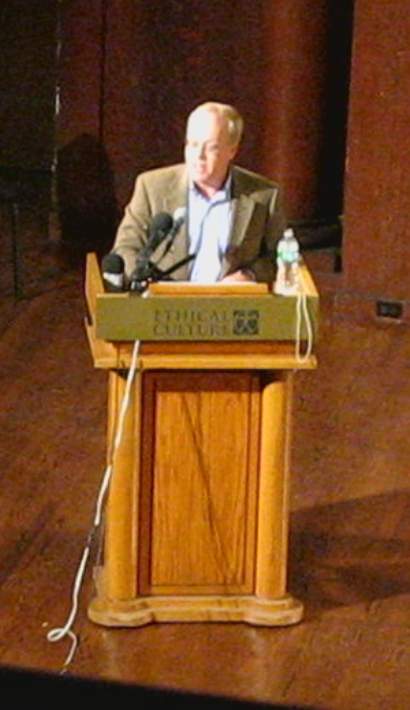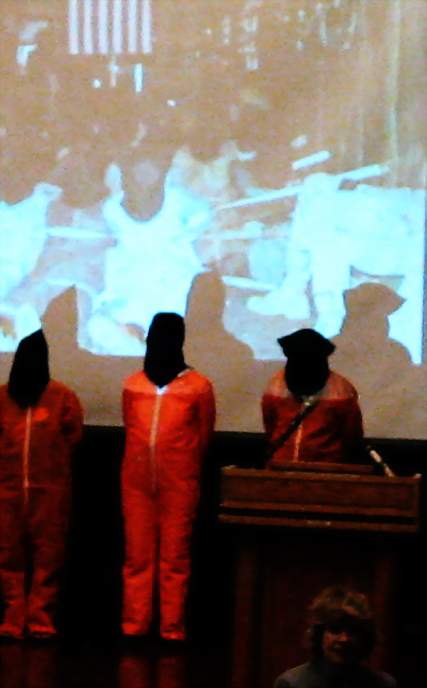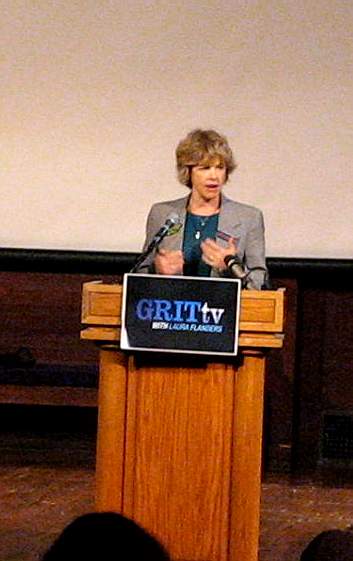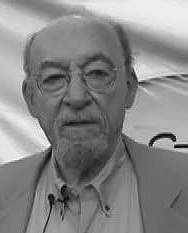Podcast: Play in new window | Download
Host Updates:
- Jose Padilla Sues John Yoo
- Four Uighurs Released To Bermuda
- State Secrets – ACLU’s National Security Project.
- State Secrets – Torture Photos – Release them, so the US can see what their government did.
- State Secrets – CIA Fights Full Report on Tortured Detainees
- Obama Refuses to Show Visitor’s List to the Whitehouse / Coal Company?
Segments this week:
- Peter Weiss : International Human Rights Law and the Royal Dutch Shell Settlement
- A Revolution Books Town Hall Meeting: TORTURE AND THE NEED FOR JUSTICE – Chris Hedges / Laura Flanders
- For WBAI – Men, Mobs and Law by Rebecca Hill
——-
Peter Weiss : International Human Rights Law and the Royal Dutch Shell Settlement
Europe’s largest oil company Royal Dutch Shell settled a landmark lawsuit last week, agreeing to pay 15.5 million to avoid a trial over it’s alleged involvement in human rights violations in the Niger Delta. The case was brought by relatives of human rights and environmental activists killed in Nigeria who accused Shell of complicity in the 1995 executions of Nigerian writer and environmentalist Ken Saro Wiwa and eight others. Charges in the case include summary execution, crimes against humanity, torture, inhumane treatment, arbitrary arrest, wrongful death, assault and battery, and infliction of emotional distress. Attorney Peter Weiss explains how historic laws such as the Alien Tort Claim are used to hold multinational corporations accountable for human rights crimes.
Peter Weiss:
- They (Royal Dutch Shell) knew all along that they were complicit. Decades ago I was involved in the struggle against colonialism in Africa. What that settlement represented was a victory against neo-colonialism.
- I think we all hope at the Center for Constitutional Rights that this will send a signal to other companies.
- Peter Weiss and Rhonda Copeland were instrumental in beginning the first cases in which human rights violations, taking place in other countries could actually be litigated in the United States.
- Alien Tort Statute Claim: We first discovered that during the Mei Li massacre. It’s a one sentence law that goes back to the first judiciary act in the United States in 1789.
- It simply says, an alien shall have a right of action in district court for a violation of the law of nations. (as international law was called in the 18th century)
- Ten years later Amnesty International got in touch with CCR, saying we have this torturer in Paraguay. Which became known as Filartica – 1978 / 1980 was the decision. It set the stage for hundreds of cases.
- About 15 years ago, CCR applied that statute to the human rights crimes of corporations in foreign countries.
- We’ve had a few victories and one of them was the UNOCAL case, where UNOCAL was using slave labor. That case was settled. Now, the Wiwa case was settled.
- If you’re familiar with what corporations are doing around the world, you can imagine how many such cases can be brought.
- Royal Dutch Shell was actually paying these Nigerian soldiers that were committing these atrocities.
- The worst thing that they did was go to the Nigerian government and say we have to get rid of these trouble makers.
- Nigeria was under a corrupt dictatorship at the time.
- We’re not the only ones, the Center for Justice and Accountability out in California have victories against Salvadorian torturers
- Jerry Nadler had a hearing on the state’s secrets act and on the opening statement, he says people bring these suits and the government comes in and says state secrets, the suit can’t go forward. But there’s an international law says Nadler, that has to be a remedy for every right.
Guest – Peter Weiss, former Vice President, Center for Constitutional Rights and Vice President, of the International Association of Lawyers Against Nuclear Arms.
—–



A Revolution Books Town Hall Meeting: TORTURE AND THE NEED FOR JUSTICE
We hear from Laura Flanders, journalist and host of GRITtv, and Chris Hedges, former New York Times Mideast bureau chief, author of many books specializing in American and Middle Eastern politics and society. He spent nearly two decades as a foreign correspondent in Central America, the Middle East, Africa and the Balkans. He was also the Middle East bureau chief for The New York Times. Chris Hedges’ new book, “Empire of Illusion: The End of Literacy and the Triumph of Spectacle,” will be out in July and can be preordered at your local bookstore.
Speakers :
- Michael Ratner, is the president, Center for Constitutional Rights, and an international human rights lawyer
- Laura Flanders, journalist and host of GRITtv
- Jeremy Scahill, investigative reporter and author of Blackwater: The Rise of the World’s Most Powerful Mercenary Army
- Sister Dianna Ortiz –founder and director of Torture Abolition and Survivors Support Coalition International (TASSC)
- Gitanjali Gutierrez, attorney for the Center for Constitutional Rights representing prisoners held at Guantanamo
- Chris Hedges, former New York Times Mideast bureau chief, author “American Fascists”
- Andy Zee, spokesperson for Revolution Books and author of “The Collapse of ‘The Movement’; the Resistance and the Revolutionary Movement We Need”
Organized by Revolution Books / Libros Revolucion
—–
For WBAI Listeners
Men, Mobs and Law by Rebecca Hill
Men Mobs and Law is the title of Rebecca Hill’s new book that explores the complexities of protest movements, race, class and gender. Hill draws comparisons in two types of left protest campaigns, those that defend labor organizers from prosecution and the anti-lynching groups that seek to memorialize lynching victims. Hill says, both groups have influenced each other throughout history and she specifically connects the narratives and stories of the NAACP’s anti lynching work to the IWW’s labor defense campaigns.
Rebecca Hill’s treatment of these dramatic stories has been called “fresh, lively, richly detailed, and impassioned.”
Rebecca Hill:
- When I first started the book it was about martyrdom and the American Left and heroic politics. I’ll take these particular cases, John Brown, Haymarket etc.
- In the research I found that this other problem that there is no law enforcement and the source of terror that black activists were dealing with was extra-legal. . . . and their anti-lynching activism that started in the 60s – and I then went back to Ida B Wells, Dubois – 1887-1890s
- Ida B Wells talking about how dangerous passion is. This is a problem in leftest activism in general. It goes to the big questions of political theory and rationale, the role of emotions, questions of what is the meaning of popular action,
- I didn’t want to condemn either side, the anti lynching movement strategy or and the socialist left defense organizing, because they both came out of experiences that informed their politics.
- If you’re facing terroristic mobs, you’re going to respond with a strategy. The anarchists and socialists movement response spoke to the lynching and their response was in inadequate – “rise up in self defense.”
- If you lived in the post reconstructive South, rising up in self defense was not realistic without legal protection.
- What came out of the Haymarket movement in the 1880s was the idea that the key element of solidarity in a labor movement is when somebody is arrested, or victimized as a result of organizing, its the membership that can save them. Not the law. The law is a tool, it’s not enough perhaps.
- The courts are structured by the ruling class, they’re stacked against the worker who is in court. They didn’t want the court room take away from the radicalism of the movement.
- Elizabeth Gurley Flynn – defense expert in IWW trials and Sacco Vanzetti case. Anarchists connected to Sacho and Vanzetti case didn’t want structure and organizing
- I was very active in the Mumia Abu Jamal campaign, you see the greater successes in the popular defense organizing it’s not based on the legal strategy, its when is the movement stronger. You see more victories in the thirties because the labor movement was big and the consensus was moving to the left during the New Deal
- John Brown’s defense is close to the fugitive slave rescues which were anti-court . John Brown’s notion that the courts are wrong and should answer to a higher power, not the current law of slavery. John Brown attempted to make available weapons for slaves to take up arms. See the book John Brown Mysteries
- I don’t really think of John Brown as a religious zealot, I think he really believed in popular organizing and popular activism.
Guest – Rebecca Hill, author of Men Mobs and Law.


